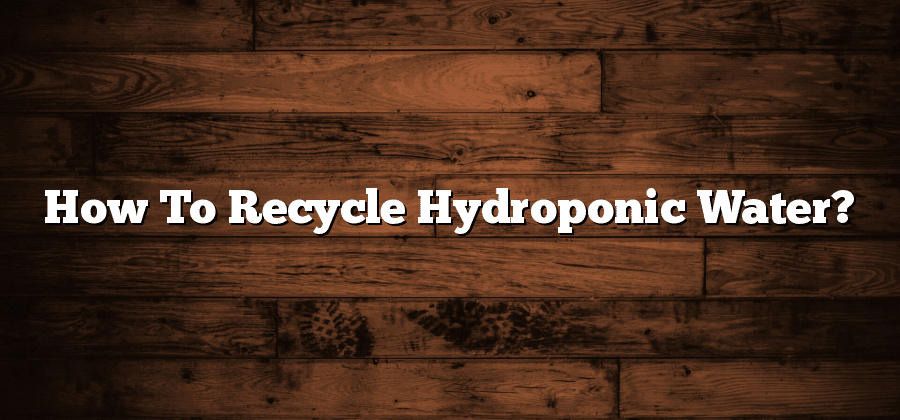Understanding Hydroponic Water Recycling
Hydroponic water recycling is a crucial aspect of hydroponics, playing a vital role in the sustainability of this innovative farming method. As water is the primary medium for supplying nutrients to plants in a hydroponic system, it is essential to understand how water recycling works and why it is essential.
Water recycling in hydroponics refers to the process of collecting, filtering, and reusing the nutrient-rich water that flows through the system. Instead of allowing the water to be wasted and drained away, it is captured and treated to remove impurities and pathogens, making it suitable for reuse. This not only conserves water but also reduces the need for constant nutrients replenishment, contributing to cost savings and environmental sustainability. By gaining a deeper understanding of hydroponic water recycling, farmers can optimize their systems, minimize resource usage, and maximize yields.
The Importance of Water Conservation in Hydroponics
As hydroponic systems continue to gain popularity in agriculture, the importance of water conservation becomes increasingly significant. Unlike traditional soil-based farming, hydroponics relies on a precise balance of water and nutrients to facilitate plant growth. This controlled environment allows for optimal resource utilization and reduces water wastage typically associated with conventional farming methods.
Water scarcity is a global concern, and the agricultural sector is a major contributor to this issue. By adopting hydroponics, which uses up to 90% less water compared to traditional farming, growers have the opportunity to make a substantial impact on water conservation efforts. This not only helps to preserve our planet’s limited water resources but also allows for sustainable agricultural practices that can support food production for future generations. In addition, by implementing advanced water recycling and filtration techniques in hydroponic systems, growers can further reduce their water consumption and minimize environmental impact.
Assessing Water Quality for Recycling in Hydroponics
Water quality is a critical factor to consider when it comes to recycling water in hydroponic systems. The success of the plants grown in these systems depends on the cleanliness and purity of the water used. Therefore, assessing water quality becomes an essential step in ensuring the overall health and productivity of the plants.
There are several parameters that need to be evaluated in order to determine the suitability of water for recycling in hydroponics. One of the primary aspects to consider is the pH level of the water. The pH scale ranges from 0 to 14, with a neutral pH value being 7. In hydroponics, a slightly acidic pH level around 5.8 to 6.3 is generally recommended for optimal plant growth. However, this may vary depending on the specific requirements of the plants being cultivated. Additionally, the water’s electrical conductivity (EC) and total dissolved solids (TDS) should be measured to ensure they fall within acceptable ranges. These parameters reflect the concentration of minerals and nutrients present in the water, which directly impact the plants’ ability to absorb essential elements for growth.
Selecting the Right Filtration System for Hydroponic Water Recycling
When it comes to hydroponic water recycling, selecting the right filtration system is crucial for ensuring the health and productivity of the plants. With the advancement in technology, there are various types of filtration systems available in the market, each serving a specific purpose. It is important to understand the different options and their features in order to make an informed decision.
One common type of filtration system used in hydroponics is the mechanical filter. This type of filter removes larger particles such as debris, sediments, and algae from the water. By eliminating these contaminants, mechanical filters help to prevent clogging in the system and maintain the clarity of the water. Additionally, some mechanical filters also come with a secondary layer of filtration, such as activated carbon, which further removes dissolved organic matter and odors from the water. This not only improves the water quality but also enhances the overall hygiene of the hydroponic system.
Implementing Proper Disinfection Methods for Recycled Hydroponic Water
Proper disinfection methods are crucial when it comes to recycling water in hydroponics. The recycled water carries various contaminants, including pathogens and microorganisms that can harm the plants. Therefore, it is essential to employ effective disinfection techniques to ensure the safety and health of the hydroponic system.
One of the most commonly used methods for disinfecting recycled hydroponic water is through the use of ultraviolet (UV) light. UV light has proven to be highly effective in killing or deactivating pathogens, bacteria, viruses, and other harmful microorganisms present in the water. It works by damaging the DNA or RNA of these microorganisms, ultimately rendering them unable to reproduce and cause harm. UV disinfection is a reliable and chemical-free method that can efficiently reduce the microbial load in recycled hydroponic water.






